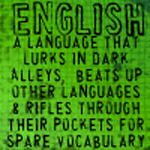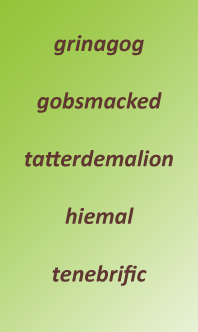
ALL WEEK, PEOPLE have been Speaking Out. I’ve been impressed by what I’ve read, although it’s not a fraction of what’s out there. I intended to write several posts but life got in the way: it’s been a strange week for me. I’m going to address two important geek-related topics I had planned to talk about in this two-part (as the wonderful Jess Hartley called it) “epilogue edition.”
Today I’ll talk about language, and tomorrow about how weird is weird. A week of Speak Out with Your Geek Out should have seven days in it anyway!
 I ARE A WORD GEEK
I ARE A WORD GEEK
I absolutely adore English. I always laugh to read this definition, which may or may not be properly attributed to writer James Nicoll: “English is a language that lurks in dark alleys, beats up other languages and rifles through their pockets for spare vocabulary.”
I am, by turn, a grammar nazi and a free-adopter of jargon and slang. I have unabashed, unrestrained orgies with multisyllabic words so archaic my grandmother would think them old-fashioned. I take markers to signs in supermarkets that say “Vine-ripened Tomato’s” and I refuse to buy flowers from a street-corner seller offering “Bokays.” I believe in using the right word, and calling it le mot juste when it pleases me.
I recognize, and accept, that sometimes I am not heard or understood — that, in fact, I have actually failed in my effort to communicate — by doing that.
IT WASN’T ALWAYS SO
Here’s your “Geek Out” theme for this topic. Much of my youth I was hassled for “talking too smart.” Around 9th grade, I made a conscious decision to stop “talking smart.” Maybe people would not dislike me so much? Never mind that I wasn’t “talking smart” in order to “show off,” I was just talking the way I talked, using words that fit what I was trying to say.
I have no idea if it helped my social standing. I know that I grew hesitant and tongue-tied, second-guessing myself whenever I opened my mouth.
It deadened my vocabulary: use it or lose it. I discovered this as a college freshman, trying to write a (comparatively) scholarly student paper… and I couldn’t find the words. The language skills I’d developed had withered, the garden unwatered and unfertilized. I felt dumb (and I don’t mean “stupid”). Eviscerated. Castrated. And yes, stupid too.
 It pissed the fuck outta me. I knew the words I was searching for; they weren’t that hard. I knew how to write better. And I couldn’t do it. I had allowed my desire to fit in to make me less than myself, less than the person I had been. And from that point on, I decided I would use any damn word I wanted, crude slang or les mots justes, and consign to the depths of hell anyone who didn’t bloody well approve.
It pissed the fuck outta me. I knew the words I was searching for; they weren’t that hard. I knew how to write better. And I couldn’t do it. I had allowed my desire to fit in to make me less than myself, less than the person I had been. And from that point on, I decided I would use any damn word I wanted, crude slang or les mots justes, and consign to the depths of hell anyone who didn’t bloody well approve.
ENGLISH, MY LOVER
This language is rich, vibrant, juicy, evocative, flexible, powerful, lively — evidently more so than almost any that has ever been used since humans started talking. The rules are firm, strong, and to be followed religiously — except when they’re not. The Academie Française made a different, sweepingly governmental choice to support only true French words, throwing out the creeping franglaise of the 1960’s, and (imnsho) thus they risk consigning a lovely language to the zombification of Latin. I know my tolerance for, and use of, non-standard usages marks me (in some eyes) as contributing to the degredation of our honorable mother tongue.
When I break rules, I make an effort to do so deliberately, to make my point. And yes, I will judge you, my fellow WoW guildie, when you type “how r u?” when I log in, because over the course of days it grows clear that (a) English is your native language, but (b) you can’t write normally if you wanted to. Yet I smile when greeted (all caps) “HAI WINTER!” by someone else, because I know they can, and I accept malapropisms from non-native speakers without a second thought.
YOU PHAIL!
I risk being pilloried for my mistakes, my typoes, my own ignorance. I recently mixed up “breech” and “breach” in print. (Since corrected.) Arguably, that’s a trickier distinction to learn than “they’re, there, and their” yet The Oatmeal got it (mostly) right. Everyone should have learned such things by their senior year of high school. Yet you can’t read five pages of the Net without bumping into such errors. (Read the wonderful Hyperbole and a Half on the abuse of alots. Read her even funnier one on how dogs don’t understand moving, but that’s off-topic. Read it anyway, when you get a chance. Heck just read them all; you’ll thank me later.)
Irregardless (a word I use here to make a point), English is endlessly changing. That’s part of its strength. Breech/breach isn’t going to change any time soon — and they’re/there/their should not — because both these examples embody valuable connotative differences. But I am amused by, and willing to use words like using teh and leet and imnsho and phail and irregardless, to write the unword outta (as in “it pissed the fuck outta me” up above, never mind the scatology and obscenity). These things have their places, bespeaking something that the “correct” word does not, or says in the not-quite-right way.
(For the record, I don’t use irregardless except in special cases like this. It’s still wrong, to me, but I accept it is probably going to take root and thrive in time.)
I believe that place is absolutely dependent upon breaking the rules deliberately and not out of ineptitude or ignorance. English usage is as much art as science. There is more than one way to correctly say almost anything. But there are an infinite number of ways to do a crappy, bad job of it too. Learn the damn rules and understand the history of the usages while you’re at it. Then you can bend and break the rules all you like.
WITLESS (Because brevity is not one of my soul’s virtues)
I don’t write short. I risk herds of teal deer (aka TL,DR for those of you not familiar with the use) for my walls of words. I’ve had co-workers offer phony smiles while telling me they were able to condense my emails to a sentence or two, to help someone else understand what I said.
I’ve also had co-workers say they have to take a deep breath before plunging in, but always knew that when I took the time to write long emails, it would be “all meat.”
I’ve been told that no one reads blog posts longer than 600 words. That won’t even take you to HAI WINTER, above. Yet those who read my long posts compliment me on what I have to say. Bloggers link to me, saying “This woman tells good stories.” So I conclude that, if you’re only looking for a soundbite, these are not the droids you are looking for. Move along.
LEARNING TO TALK EVEN SMARTER
I do understand that the ultimate purpose of language is communication, sharing ideas, and not bludgeoning someone with my vocabulary. I know that espousing egregiously excessive erudition, while entertaining, misses the point. I know that Churchill’s famous, brief “blood sweat and tears” speech is notable among those linguistically-inclined for being emphatically Anglo-Saxon in its word-choice. That is partly why it is such a forceful, persuasive speech.
(And yes, I also know that’s not the accurate quote but it is how the speech is known. My intent is to evoke your recognition over literal accuracy. It is always about the choices we make.)
I am trying to learn to be more concise. It is more difficult than my first three trips into Languageland: learning to love the language, unlearning my passion for it, then getting to know it anew. All those journeys taught me something, and this one is too. I will keep at it.
I GEEK LANGUAGE
The language is a wonderful tool, and for me it is something of both game and hobby. I can use it to make you feel. Sometimes I can use it to make you think. If you let me get away with it, I’ll use rhetorical tricks and play with your head.
I make a distinction between grey and gray when I write, although it has no basis in any reality beyond the fact that people often agree with me when I explain that, to me, “grey” is a cool, blue-white silvery color and “gray” is a warm, almost taupe and thoroughly neutral non-color. I’ll use pop culture metaphors and I’ll make reference to writings hundreds of years old. Follow me if you can, because it is all more fun to play with than I can constrain.
I’m just glad I healed the high school breach in my language skills. I completely geek language and I hope you enjoy visiting the well-watered, well-fertilized garden where I play today.


Now you’ll get people jealous of you because you can do art and write. I’ll just have to console myself that I’m probably a better programmer than you. 😉
Okay, more seriously, it’s great that you’ve discovered and accepted this part of you. I think many of us geeks had that “you’re too smart” period in our lives. Now you just need more time to do everything you enjoy properly. 😉
I guarantee you’re a better programmer than me, Brian — last time I tried to program anything, I was learning BASIC, and the demands of this website’s back end are enough to make me tear out my hair.
And yeah, I quite certain this is a common geek theme, unremarkable in that respect. The writers and editors and storymakers I know all surely have faced it, along with “You can’t read all those books; what are you trying to prove carrying them around!”
Moreover, anyone who is “jealous” is missing the entire point here. I do this stuff because it’s FUN for me. That’s it. That’s what being a geek over something is about.
Ahhh, the torments of school days. How I still completely fail to miss them. Alas, I was not picked upon for any such elevated reason as erudition but because I wore glasses… Oh well. I suppose to the minds of countless playground tormentors throughout global history it probably all comes down to the same universal reason: Look For Someone – Anyone – Who For Any Obvious Reason Does Not Fit In.
However, that’s off on a tangent. Back on the topic of saying things at length, as an artist can’t you just do a quick doodle if someone asks you to be brief? A picture being worth a thousand words and all that… 😉
Heck, I just used a ‘;)’ as a sort of minidoodle visual shorthand to attempt to convey a sense of mischief I could otherwise have taken several sentence over…
Gah! ‘sentence’ should have been ‘sentences’ and there is no edit facility on this blog.
:shakefist:
Although in this day and age of internet links, many of us do use pictures or occasional youtube links (even if they’re not ones which we ourselves are responsible for creating) to convey thoughts where mere words fail…
I have often been accused of building clocks when people ask me the time, Charles. I want them to be quite sure they’re getting the complete picture, the right answer.
Come to think of it, that’s probably some of the roots of my librarianship too.
Ah, I think I see what you mean. I sometimes put ‘AD’ in dates when signing things because I want it to be absolutely clear which system for numbering years I’m using…
Did that earlier this evening in fact.
I started a new job 18 months ago. In this job, I am now required to email my boss with updates and questions (as well as emailing the customers). He asked me to upload a script, and I requested clarification – should I use a new account, or an extant one? He replied with two words: “Extant? What?”
The word is gradually sliding out of my vocabulary, because he’s caught me using it twice since, and each time I’ve gotten smacked down for it. I guess he just doesn’t like it.
Depending on your relationship with your job and boss, consider whether you can make it a “teaching moment”: “Extant — it’s a word like ‘existing’ or ‘already made’ but implies a stronger sense of something created and polished, and ready to be used.”
Or you can go the Churchill route with your boss. “I can make a new one or use an old one.”
Either way, don’t let the word get away. You used it here, didn’t you?
I get email “inspirations” from Simon Sinek (the “Start with Why” guy) and this reminder of an old one came up next to notification of your post here: “The difference between those who change the world and those who don’t is that those who do believe they can.”
You can. Believe it. (I’ve seen it.)
I just read this today and boy am I glad I did. I’ve not been familiar with you, but I shall be. Thank you for making my day in the sandbox bright.